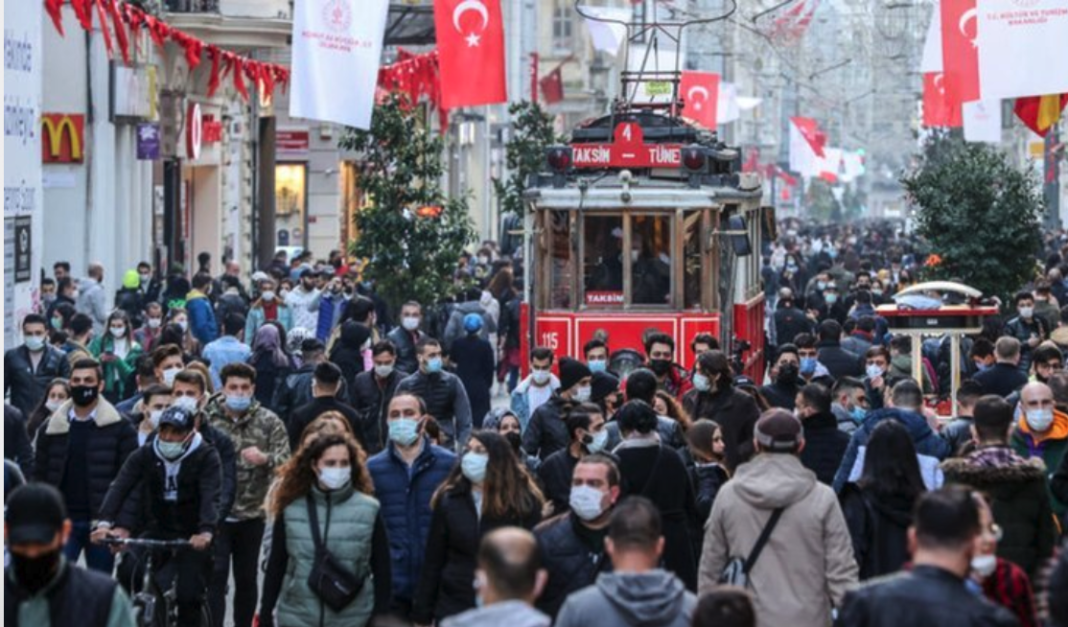While sights are largely set on Turkey’s presidential elections, pollsters and pundits warn that the results of parliamentary elections may sway the whole race in the event of a run-off for president. Ezgi akın reports in Al-Monitor on April 22, 2023.
With less than four weeks to go to Turkey’s critical elections, some 15% of voters remain undecided or unsettled, and their last-minute decisions will likely sway the outcome of the tightly contested race, pollsters say.
Undecided voters, particularly young people who will vote for the first time, are increasingly finding themselves the center of attention of the campaign ahead of the May 14 elections. Pollsters say the parties need to secure the support of undecided voters in the parliamentary elections, while voters who are decided but disgruntled with their candidates will be the kingmakers of the presidential poll.
For the four-candidate presidential race with two top contenders — incumbent President Recep Tayyip Erdogan and main opposition leader Kemal Kilicdaroglu — pollsters say the majority of voters have made up their minds, but a significant percentage is not completely sure.
Ulas Tol, director of research at the Istanbul-based Social Impact Research Center, told Al-Monitor that the uncertainty is what makes this vote different from the former elections over the past decade.
“There are not that many undecided voters, but there are disgruntled voters, meaning they support one side but they are not happy about it. They are ready to break off,” he said. “If there were an index of ‘openness to persuasion,’ we could say that it has reached its highest level in the past 10 years.”
According to Tol, supporters of Erdogan and his ruling party were less settled in their choices than potential voters for Kilicdaroglu and his bloc. Yet, the alliance of six-parties led by Kilicdaroglu’s Republican People’s Party (CHP) has been unable to sway these voters, Tol noted, adding that some of them could either opt for the other presidential candidates or simply protest the elections by abstaining.
The scene seems even more complicated for the parliamentary elections, which will largely be fought between the Erdogan-led ruling alliance, six-party opposition alliance and leftist Labor and Freedom alliance, which is led by the pro-Kurdish Peoples’ Democratic Party members. A poll published by Istanbul-based Yoneylem this week suggests undecided voters represent the third-largest bloc in the lead-up to the race.
Derya Komurcu, Yoneylem’s director of research, told Al-Monitor that the combination of undecided voters and those who are not planning to go to the ballots on May 14 has reached 15% over the past month, a figure that amounts to kingmaker in the close race.
According to Komurcu, the increase marks a departure from previous elections. “As elections near, we expect a decline in the number of undecided voters,” he said.
Two main reasons stand out in the increase, according to Komurcu: First, some of the voters have become disgruntled with their parties’ performances during the campaign period, but haven’t decided where to turn yet. Second, the electorate is not as interested in the parliamentary elections as it is in the presidential elections, as Erdogan’s executive presidency, which was introduced in 2018, has diminished the importance of the parliament.
Whether they are disgruntled with their choices or still undecided, both Tol and Komurcu agree that young people, particularly those who will vote for the first time, make up the majority of these voters. “Young people aged 18-25 make up about a third of that 15-point pie,” Komurcu said.
Change is needed, but so is stability
While the majority of the public believe that the country needs change, the question boils down to whether the change the CHP-led alliance pledges to bring about would be positive.
Despite the acute cost-of-living crisis with breakneck inflation and the government’s fatally slow response to the Feb. 6 earthquakes, the country’s main opposition-bloc and its joint candidate Kilicdaroglu are still unable to secure the support of undecideds.
One of the most important reasons that prevent disgruntled ruling party supporters from breaking away from their established choices is their inability to envision a new establishment to replace the current status quo, Tol said.
Berk Esen, an assistant professor of political science at Istanbul’s Sabanci University, agrees. “In their minds, there might be questions over whether Kilicdaroglu can lead the country out of a potential crisis,” he told Al-Monitor, adding the septagenarian might not be particularly appealing to the young people who have still been unable to make up their minds.
According to Esen, Kilicdaroglu’s public appearances with the CHP’s popular Istanbul and Ankara mayors could help the opposition garner the support of these voters, as both mayors wield significant public support owing to their successful leadership at the helm of the country’s two major metropolises. “Here, the mayors are the ones who will turn the tide,” he said.
The opposition’s failure to convince presidential candidate Muharrem Ince from withdrawing from the race appears to be another important hindrance before the opposition bloc. The former CHP politician who now leads the Memleket (Homeland) Party appeals to the same voter base as the main opposition. With polls putting his support up to 8%, Ince’s presence in the race increases the chances of a runoff poll in the presidential elections. This, in turn, makes it even more critical for opposition parties to win the majority in the parliamentary elections. Pundits say the bloc that secures the parliamentary majority would have a psychological advantage in the second round of the presidential vote, which would be conducted two weeks after the first.
Should the ruling alliance secure the parliamentary majority, the opposition may have difficulty sustaining morale, Esen thinks. He noted that appealing to undecided voters under such circumstances would be even harder.
“In the parliamentary elections, undecided voters may bring about a new and highly unanticipated dawn,” he concluded.

